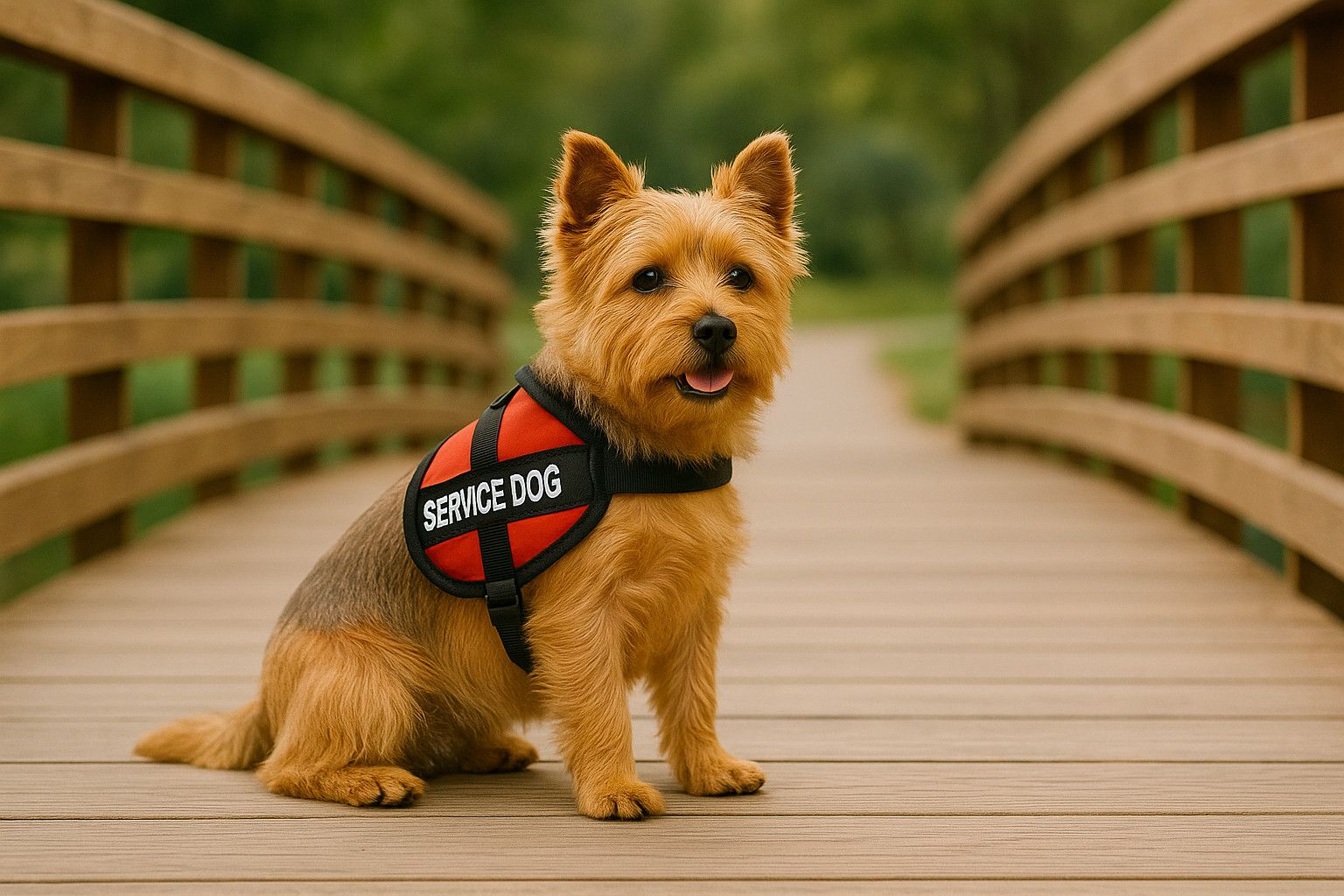Norwich Terrier as a Service Dog

Service dogs play an essential role in assisting individuals with disabilities, providing support that varies from physical assistance to emotional companionship. When considering the Norwich Terrier for such roles, their unique characteristics must be evaluated to determine their suitability and effectiveness as service dogs. While this breed is not commonly chosen for service work due to its size and temperament, understanding the attributes that they possess may reveal specific situations where they can excel.
Norwich Terrier Overview
The Norwich Terrier is a small, sturdy breed with a charming personality. Originally developed in England for hunting vermin, these dogs are known for their alert nature and spirited demeanor. Despite their diminutive size, Norwich Terriers are robust and hearty, with a surprisingly adventurous spirit.
Physical Characteristics
Norwich Terriers are characterized by their compact, well-proportioned build, making them one of the smallest working terriers. Generally, they weigh between 11 and 12 pounds and stand about 10 inches tall at the shoulder. Their wiry double coat offers protection from various weather conditions and is complemented by their lively dark eyes and perky ears, giving them an expression of curiosity and alertness.
- Size and Strength: Their small stature limits their ability to perform tasks requiring substantial physical strength, such as mobility assistance for individuals with severe impairments. However, their size can be an advantage in settings where larger breeds might be cumbersome or impractical.
- Energy Levels: Norwich Terriers possess high energy levels and stamina, making them capable of being active throughout the day. This energy needs to be channeled correctly to ensure they remain focused and calm while performing duties.
- Adaptability: The breed's ability to adapt to various environments, whether urban or rural, can be beneficial in service work, allowing them to accompany handlers in diverse settings.
Temperament and Attitude
Norwich Terriers are affectionate, intelligent, and resilient, with a playful disposition tempered by a stubborn streak.
- Social Nature: While generally friendly, Norwich Terriers can be wary of strangers, which might necessitate additional socialization for service roles that require public interaction. Their playful nature can offer comfort to those needing emotional support.
- Independence: Their independent nature may pose challenges in service dog training, which demands obedience and a high degree of responsiveness.
- Alertness: They are naturally vigilant, which is beneficial for alert-based tasks such as hearing alert work, where they signal specific sounds to their handler.
Despite these qualities, their occasional tendency to be territorial or bark excessively can require careful management to ensure appropriate public behavior.
Types of Service Work
The role of a service dog requires specific skill sets and temperaments that do not align perfectly with every breed, including the Norwich Terrier. However, their attributes can still render them useful in certain niches of service work:
- Emotional Support: The friendly and affectionate nature of the Norwich Terrier makes them suitable companions for emotional support roles, where their small size allows them to engage closely with their handlers.
- Medical Alert: Their alertness can be harnessed for alert work, such as signaling changes in their handler's blood glucose levels or reminding them to take medication. This work, however, requires precise and consistent training.
- Therapeutic Companionship: Providing comfort and emotional breaks in assisted-living facilities or hospitals might be practical applications due to their adaptable nature and small size.
Norwich Terriers are less suited to roles involving significant physical interaction or support, as their size and strength are limiting factors.
Health Considerations
A critical aspect of an effective service dog is their overall health, which directly impacts their ability to work reliably.
- Genetic Predispositions: Norwich Terriers are prone to certain genetic conditions, such as mitral valve disease and hip dysplasia. These health issues necessitate regular veterinary check-ups to ensure sustained fitness for service work.
- Life Span: With an average lifespan of 12-15 years, these dogs can serve as companions for many years, though age-related health issues might limit this as they grow older.
- Care Requirements: Regular grooming and dental care are necessary to keep them in optimal condition—essential for maintaining their effectiveness as service animals over time.
Breed-specific health considerations are paramount when deciding on a Norwich Terrier for service roles, as these can affect their suitability and longevity in performing tasks.
Training and Suitability
Successful service dogs necessitate rigorous training and a temperament that aligns with the responsibilities required of them.
- Trainability: Norwich Terriers have moderate trainability, largely due to their intelligence. However, their independent nature requires a patient, consistent training approach to cultivate obedience and reliability.
- Focus and Attention: Maintaining attention during tasks can be challenging due to their distractible nature, common in terrier breeds. High-quality training should emphasize focus through positive reinforcement techniques.
- Learning and Adaptation: Their alertness and curiosity are beneficial traits, though these need careful guidance to ensure appropriate behavior in public settings.
The suitability of Norwich Terriers as service dogs is heavily dependent on their individual temperament and behavioral development through specialized training programs.
Summary of Norwich Terrier
The Norwich Terrier presents a unique case as a service dog. While not a conventional choice due to their size and temperament, they hold specific traits that can be advantageous in certain contexts.
- Strengths:
- Affectionate and sociable, ideal for emotional support roles.
- Alert and responsive, useful in some medical alert capacities.
- Adaptable to diverse environments.
- Weaknesses:
- Limited physical strength, unsuitable for mobility assistance.
- Independent and sometimes stubborn, requiring focused training.
- Prone to certain health issues that may affect service longevity.
- Ideal Roles:
- Emotional support and therapeutic companionship.
- Medical alert tasks requiring minimal physical intervention.
In conclusion, the Norwich Terrier can serve effectively in select service dog roles, particularly where their size and temperament can be assets rather than limitations. Comprehensive assessment and tailored training are imperative to maximize their potential as service animals.











